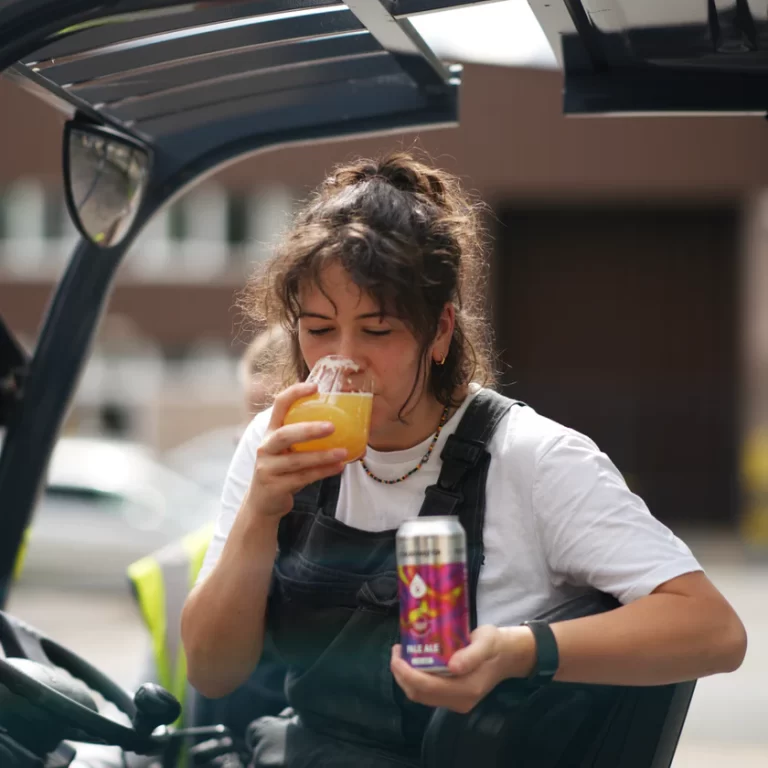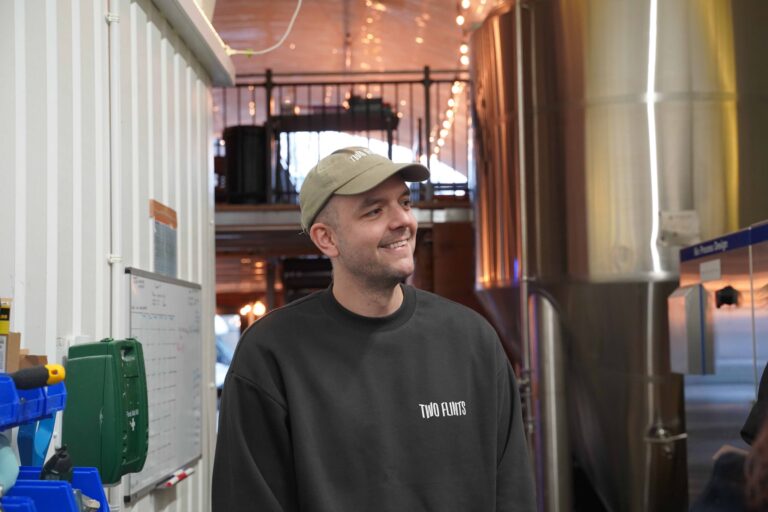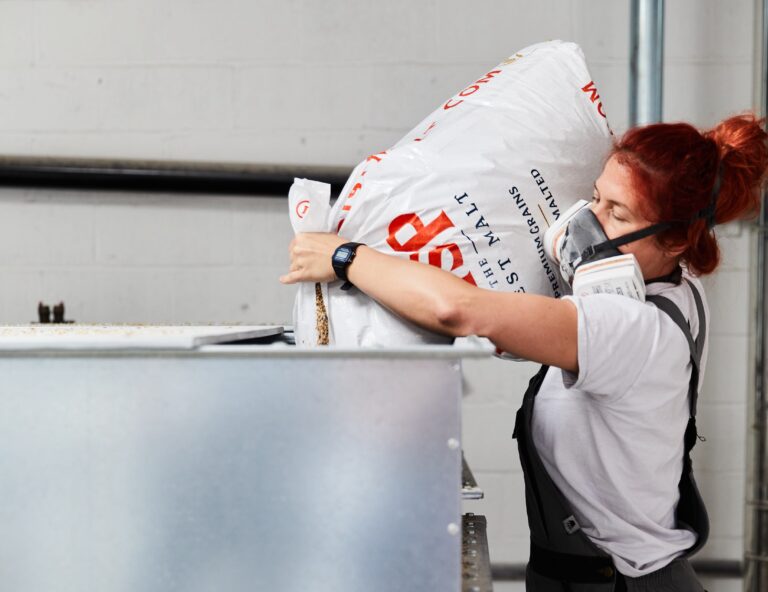For nearly 10 years, Kirkstall Brewery has been bubbling away making great beer that people enjoy. It’s now armed with a shiny new taproom, and output tasting better than ever so if you’re not already aware, it’s about time to sit up and take notice.
If you’re ever in Leeds, it would be understandable if you took the A65 a few minutes north-west out of the city to visit one of Yorkshire’s must-visit attractions. I talk not of the much-loved Emmerdale Studio Experience but instead, another temple to a pillar of British culture, Kirkstall Brewery.
A literal stone’s throw from the attraction honouring Yorkshire’s favourite TV soap, the brewing outfit celebrates its 10th anniversary in 2021 But despite an impressive near decade in business, its ethos and approach to beer has changed not one jot; and that’s to make beer the team and their customers enjoy.

“You’d be stupid not to be aware of market trends but for me, it’s equally foolish to blindly chase them, too,” explains John Kelly, managing director of Kirkstall Brewery. “This business has been built on consistency and stability. Chasing the new, the flavour of the month, is a very short term attitude and it’s not what we’re about.”
And as the saying goes, actions speak louder than words.
Kelly is joined in Kirkstall’s excellent, brand-new taproom by production manager Will Inman. The taproom is as far removed from an afterthought as possible. Instead, it’s a labour of love and a intricate homage to the classic British pub.
Inman was recently described online as a ‘brewer’s brewer’ and it’s easy to see why. Like Kelly, he’s pensive, thoughtful and reserved. Little to nothing is said without it being internally mused on a moment previously.
The week prior, Inman had returned to his old employer; Thornbridge of Bakewell, Derbyshire. He was there to brew a collaboration with Thornbridge brewer Dominic Driscoll. The fruits of their labour was 1946 Mild, a 3.8% beer designed to recreate Joshua Tetley’s post-war light mild recipe.
“(Head brewer) Rob wasn’t around when I arrived so I just made myself a cup at tea and felt right at home,” smiles Inman. “It was as if I had never left!”
Light work was made of the beer brewed that day. It’s been a hit with drinkers across Kirkstall’s pubs, which comes as little surprise.
“It won’t do well on Untappd. But if you’re rating it on that then you’re probably missing the point,” says Kelly. “Those that get a kick out of it probably won’t be using the app in the first place…and be drinking five pints of it too.”

While one collaboration is enough to keep most people busy, there was no let-off for Inman. Days before our visit the brewery was graced with the presence of Doug Odell, co-founder of Colorado’s Odell Brewing Co.
The Fort Collins brewery remains at the high table of independent US breweries and beers such as its 7.0% IPA played a key role in introducing many drinkers, and future brewers, to the bold, aromatic wonders of American-style IPAs.
Doug Odell has always had a fondness for the UK and he was on these shores for Cloudwater’s successful Friends & Family & Beer festival, which took place in Manchester during February. Still enamoured with the process of brewing, he took in some collaborations including one at Kirkstall.
“He’s still very much interested in seeing what different brewers bring to the table, and how different equipment works,” says Inman.
The duo would brew Appaloosa, a 5.2% keg-only West Coast Pale Ale. However, the beer was not the first time Odell and the Kirkstall team crossed paths. Because before the brewery there was, and remains, Vertical Drinks.
Founded brewery owner Steve Holt, with Kelly his first employee, the business is responsible for opening the hearts and minds of many beer fans to the the world of US beer.

The company would import, on an exclusive basis, the produce from breweries such as Sierra Nevada, Odell Brewing Co and Oskar Blues, introducing consumers to heavily-hopped beers and sparking a desire in many to make a go of brewing such styles themselves.
Holt’s love for such beers would be a catalyst for opening a brewery that often leant on US flavours. Easier said than done in 2011 when demand for such styles was not as high as it is now.
“We’ve gone through a lot of pain to get to this point but it’s been worth it.”
John Kelly, Kirkstall Brewery
Vertical Drinks is now part of Kirkstall Brewery rather than operating as two separate entities, something that has made life easier for all involved.
“We’ve gone through a lot of pain to get to this point but it’s been worth it,” says Kelly. “Previously we’d be selling Kirkstall beers internally to Vertical to supply, which made it challenging to work out how we were doing as a brewing business. It was complex but things are better now.”
Working with US breweries on such a regular basis though has offered up many benefits however, with Kelly and Holt getting a detailed insight into the US market.
“The UK market is hectic and it’s competitive, but we’ve seen this before in what happened in the States. There’s buyouts, there’s casualties and there’s the impact these moves have on the bottom line. You need to know how to act, and when to act,” he explains.”

Kirkstall’s US connections don’t end there. Before entering the world of beer, production manager Inman studied business at university. Here he would be introduced to Dave Wickett, founder of Kelham Island Brewery.
Wickett sadly passed away in 2012 but the brewery he started, and the lectures he gave at Sheffield’s Universities, would put Inman on his path in brewing. A sandwich year during University allowed Inman to travel to the US, and work in a bar located in upstate New York.
Fittingly it was here he would sample beers from breweries such as Sierra Nevada and Oskar Blues for the first time, a far cry from the macro lagers he would drink at home in the UK.
“I found them super bitter at first,” he recalls. “But they without doubt inspired me to work with beer.”
Upon returning to the UK Inman would look at opportunities in banking, though the impact of the 2008 financial crisis put paid to such endeavours. In addition to work experience at the aforementioned Kelham Island, Inman applied himself to home brewing in an attempt to recreate the beers he enjoyed overseas.
It was here he developed a passion for creating beers as well as he possibly could.
“I enjoyed the fault-finding process, working out where a problem was occurring and trying to rectify it,” he says. “I am fond of routine and getting things right; attention to detail is so important in brewing.”

In typical fashion Inman was never completely content with those early brews, despite glowing reviews from those that drank them.
“There was no point thinking ‘I’ve nailed this’ because someone says your beer is pretty good,” he recalls. “That still applies to this day. You should never think you’ve got something perfect, because there’s always another measurement you can be taking.”
Inman would go on to secure a job at Thornbridge, swiftly making his way up the ranks, from cask washer, to running the bottling line, to brewing on the automated plant all in less than six months.
“You should never think you’ve got something perfect, because there’s always another measurement you can be taking.”
Will Inman, Kirkstall Brewery
Here, he would learn a great deal more about quality assurance.
“Lot’s of people see it as a box-ticking exercise but it saves a lot of problems happening in the first place. Being meticulous always pays off and helps you keep on top of issues creeping in,” he stresses.
After four-and-a-half enjoyable years at Thornbridge, Inman was ready for a new challenge. He would meet John Kelly for a beer at the Sheffield Tap to find out that he had already been in contact with his Dominic Driscoll, who had given his then colleague a glowing report.
So three years ago, Inman joined Kirkstall as lead technical brewer to work on the its shiny new 50HL five-vessel brewhouse and lead the brewing team through the next stage of the company’s growth.
“The brew house that we have is very efficient; we’re able to use modern techniques on our more traditional core range of cask. We have the capabilities to make a whole range of beer, so we don’t need to pigeon hole ourselves into one style of brewing,” he says. “We don’t have to stick to traditional brewing that we were known for, but we also don’t have to abandon that either.”
The team can mash in every three hours with brewing taking place on average six or seven times a week. At the time of our visit, Inman expected the brewery to output 15,000HL this year.

The brewery’s cask and keg output dovetail each other well. Cask is still king with a 60/40 split over keg but the performance of either dispense takes place organically. Classics like Kirkstall Pale Ale and Three Swords are mainstays on cask, while newer hazy numbers such as Jasper perform very well. On keg, session pale ale Virtuous dominates alongside session IPA Perpetuous.
Kelly is pleased with the brewery’s foray into hazy beers but acknowledges that Inman wasn’t fully convinced in sending them out into the wild until they could guarantee shelf stability.
“We didn’t want to be one of those embarrassments having our beer explode. If it’s sitting on an ambient shelf somewhere, you need to ensure it’s safe for it to do so,” he says.

And for Inman and the team at Kirkstall, such an outlook represents the business coming full circle. From an origin importing other breweries’ beers, the company is now looking ahead to increase the amount of its own beer it sends to export markets.
He says: “Until now we’ve only really sent beer overseas to friends. But we’re now ready to look at the bigger export picture.
“One of the happiest days in this business was pouring Kirkstall beers, alongside beers from excellent US breweries we imported and saying ‘You know what? We stand up against these’.
“We’ve never been ones to rush what we do, or to chase others, but we’re more confident in the beers we make than ever before.”








